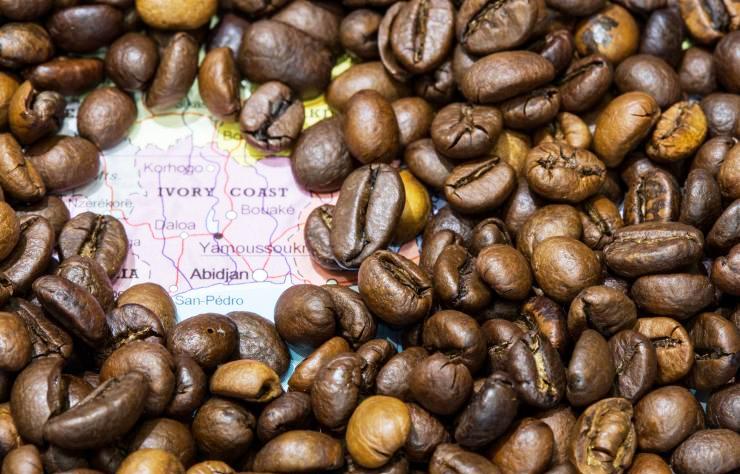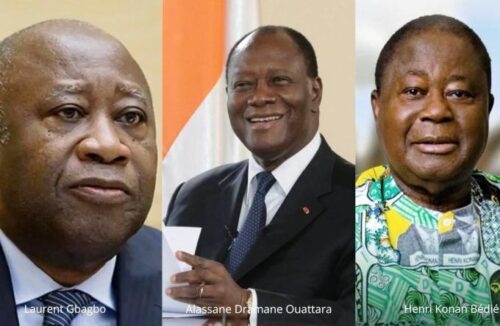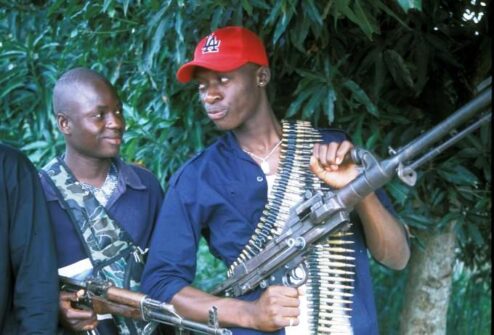Ivory Coast. An uncertain future.

A leading country in West Africa, Ivory Coast has weaknesses that could not only block economic development but also lead to turmoil. The consequences of two civil wars fought in the past decades are still felt and the leadership, who is responsible for these wars, has not yet implemented measures that could avoid the troubles of the past.
Since the death of Felix Houphouet-Boigny (considered the founding father of the country) in December 1993 the political scene in Ivory Coast is largely dominated by three men: Alassane Dramane Ouattara, Henri Konan Bédié and Laurent Gbagbo.
Ouattara is the ruling president, Gbagbo is his immediate predecessor and Bédié was the chief of state from 1993 to 1999. Both Ouattara and Konan Bédié competed for the role of the heir of Houphouet-Boigny (who ruled the country for 33 years) while Gbagbo began his political life as an opponent to the first chief of state.
During these years they fought for prominence also creating short-lived alliances. Often two of them allied to beat the third but, after having accomplished their goal, they split and one of them joined the former enemy to fight the old ally. These days there is an apparent peace, but simmering tensions are ready to explode as the 2025 presidential election approaches. There are ideological differences between the three men. On a general level, Ouattara is a Western-educated technocrat who is pro-free trade and pro-market while Gbagbo has a socialist formation and supports anti-colonialist views. But, in reality, the battle of ideas is less relevant than the conflict of personalities.

The war between the three political leaders has had a deep impact on the coexistence between the ethnic groups. The tensions among the ethnicities (that existed also under Houphouet-Boigny) escalated when Konan Bédié introduced the term “Ivoirité” (Ivoirity, or “what it is like being an Ivorian citizen”). To exclude Ouattara (who is a Muslim with ascendants in the north) from the race to become president, Konan Bédié started to distinguish between “real” Ivorians and descendants of immigrants, creating a rift within Ivorian society. This term targeted the ethnic groups originating from the north of Cote d’Ivoire that are predominantly Muslim. Even if they had Ivorian citizenship from their birth, they began to be considered and treated as second-class citizens or even strangers. Also, Gbagbo, during his presidency, embraced Ivoirité and discriminated against those ethnic groups he thought were supporting Ouattara. These ethnicities became the scapegoat in different economic and social issues, like the one concerning land ownership in the southern regions.
The groups that originated in the south tried to exclude those who immigrated from the north from the ownership of land plots in their areas even if the “newcomers” were entitled to claim them. Gbagbo’s ultimate goal was in any case to stop Ouattara from becoming president.
Two civil wars
Due to this turf war, the first ten years of this millennium for Cote d’Ivoire were characterized by turmoil. The feeling of disenfranchisement of northern ethnic groups, especially within the armed forces, brought to what is called “The first Ivorian Civil War”. On 19 September 2002, rebel forces attacked three cities (including Abidjan) before being repelled by regular troops.

In 2002. The first Ivorian civil war.
Rebels took control of most of the north of the country (including major cities such as Bouaké and Korhogo). French forces intervened since France was the colonial power that ruled Cote d’Ivoire before the independence and had (and still has) strong ties with the African country. After several failed attempts, a peace agreement was reached between the two fronts in March 2007 with the mediation of the international community. But by then Cote d’Ivoire was a country split into two, with the internationally recognized government in the south and a north controlled by the rebel forces.
A new conflict (the Second Ivorian Civil War) erupted in 2011. In 2010 presidential elections were held during the mandate of Laurent Gbagbo. Alassane Ouattara was proclaimed the winner by the electoral commission, but Gbagbo (who had run for a new mandate) refused to accept the results.

In 2011. The second Ivorian civil war.
Therefore, for a moment Cote d’Ivoire had two presidents, even if only one (Ouattara) was recognized by the international community. Gbagbo did not step down, as requested by foreign partners, and violence escalated, especially in Abidjan. In this phase Konan Bédié sided with Ouattara. On 28 March 2011, the rebel forces that ruled the north and supported Ouattara started an offensive on the rest of the country and marched southward. The pro-Gbagbo troops tried to resist but, thanks to the support of French and UN forces, the rebels prevailed. On 11 April 2011 Gbagbo was arrested and therefore Ouattara could begin his mandate. He was confirmed by popular vote in 2015 and in 2020.
After his ascent to power, Ouattara reformed the security forces, merging the regular ones with the rebel groups. The warlords that supported him (the “comzones”) during the Second Civil War were incorporated into the new security forces and gradually neutralized.

Guillaume Soro, fell into disgrace due to his contrasts with Ouattara.
They indeed posed a threat to him since they could mobilize their militias against the new president and could try to influence the new government. The political leader of the rebel forces, Guillaume Soro, fell into disgrace due to his contrasts with Ouattara. Soro served as Prime Minister under Gbagbo in a national unity government and as President of the National Assembly from 2012 to 2019. He tried to build a solid political base with the objective of becoming Ouattara’s successor, and in 2019 he announced the decision to run in October 2020 presidential elections. But he never had the possibility to compete for the office. He was accused and convicted of crimes such as money laundering and plotting an attack on the security of the state. In June 2021, he was sentenced to life. At present, he is living abroad.
At the moment, the chief of state controls firmly the security apparatus (his brother Téné Birahima Ouattara is the Minister of Defence) and a new coup seems unlikely (but not impossible). But there were cases of mutiny within the security forces due to payment and promotion issues, like in January and May 2017. Violent protests erupted at various times. The political and ethnic tensions could have consequences within the ranks of security forces since politicians could try to exploit the discontent of part of the troops to launch calls for revolt. One of the reasons for the fall of Guillaume Soro is that he was suspected by the Ouattara entourage to have supported the 2017 mutinies. (Open Photo: 123rf)
(A.C.)



